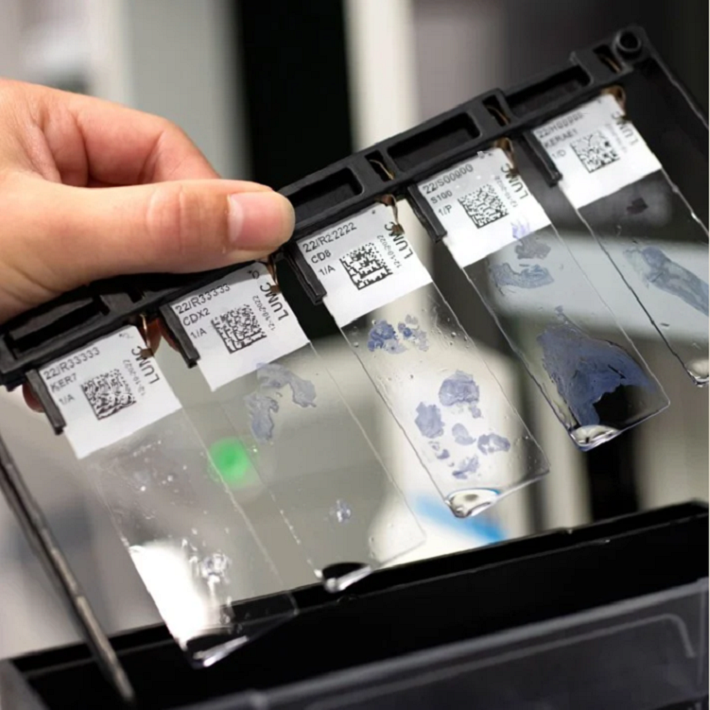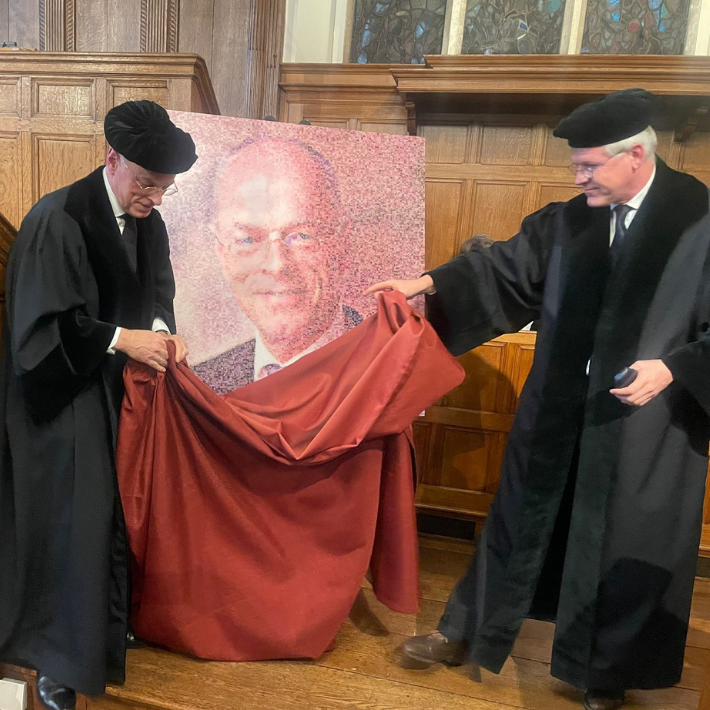Pathologie
&width=710&height=710)
Bijzondere aandachtsgebieden
Bijzondere aandachtsgebieden die een relatie hebben met onderzoeksactiviteiten, zijn:
- Bot- en wekedelentumor-pathologie;
- Gynaecopathologie;
- Nier- en transplantatiepathologie;
- Hematopathologie;
- (Erfelijke) tumoren van het darmstelsel en endocriene organen;
- Neuropathologie;
- Longpathologie;
- (Erfelijke) tumoren van de borst’
- Oogpathologie
Ieder aandachtsgebied wordt aangestuurd door gespecialiseerde pathologen, daarbij ondersteund door (moleculair) biologen en deskundigen op het gebied van ICT/dataverwerking.
Richtlijnen consultmateriaal
Hier vindt u de richtlijnen voor het insturen van consultmateriaal:
Materiaal zenden naar
Leids Universitair Medisch Centrum
Afdeling Pathologie – t.a.v. Consultservice L1-Q
Postbus 9600,
2300 RC Leiden
Looproute 854 (ontvangstbalie P2-16)
Volg instructie op locatie
Tel.: 071 526 50 52
Hier vindt u de richtlijnen voor het insturen van consultmateriaal:
Materiaal zenden naar
Leids Universitair Medisch Centrum
Afdeling Pathologie – t.a.v. Consultservice L1-Q
Postbus 9600,
2300 RC Leiden
Looproute 854 (ontvangstbalie P2-16)
Volg instructie op locatie
Tel.: 071 526 50 52
Materiaal aanleveren
1. Vries materiaal op droogijs gevroren houden in piepschuim bak, met bijbehorende documenten (verslag)*
2. Vers materiaal op ijs gekoeld houden, met bijbehorende documenten (verslag)*
3. Coupes en/of FFPE-blokjes verpakt per patiënt, met bijbehorende documenten (verslag)**
*Vries en vers materiaal versturen naar:
Leids Universitair Medisch Centrum
Pathologie – t.a.v. Consultservice L1-Q
Antwoordnummer 10392
2300 WB Leiden
**Coupes en blokjes versturen naar:
Leids Universitair Medisch Centrum
Afdeling Pathologie – t.a.v. Consultservice L1-Q
Postbus 9600
2300 RC Leiden
Checklist consult materiaal
• Volledig ingevuld aanvraagformulier;
• Alle relevante paraffineblokjes;
• Alle bijbehorende pathologieverslagen;
• In geval van bottumoren tevens uitgebreide klinische gegevens en een CD/DVD met relevante radiologische beeldvorming;
• Voor moleculair onderzoek wordt geadviseerd tenminste een HE-coupe met bijbehorend paraffineblokje met tumorweefsel in te sturen; het incompleet insturen kan invloed hebben op de doorlooptijd. Indien u alleen cytologie glaasjes of alleen DNA zou willen insturen, dit graag tevoren overleggen met de relevante patholoog.
Let op:
Een formulier (zie PDF hieronder) per patiënt, indien meerdere casus tegelijk worden ingestuurd, graag per casus afzonderlijk verpakken. De afzonderlijk verpakte casus mogen wel in een grote envelop.
Bij eventuele vragen kunt u contact opnemen met:
• Patiëntenzorgsecretariaat Pathologie via 071 526 65 03 of
• Consult Service via 071 526 50 52
De Consultservice kan geen uitslagen verstrekken. U kunt hiervoor een verzoek indienen bij het patiëntenzorgsecretariaat per e-mail: Patientenzorg_secretariaat@lumc.nl.
Externe inzendinstructies
Indien u voor het eerst patiëntenmateriaal naar ons verzendt, verzoeken wij u vriendelijk eerst contact op te nemen (via ontvangstbalie 071 52 66611) om alle belangrijke zaken zorgvuldig af te stemmen.
Volg onderstaande vereisten voor het correct verzenden van patiëntenmateriaal:
Belangrijke gegevens
De volgende informatie moet op papier meegezonden worden met het materiaal:
- De gegevens van de patient:
- Naam
- Voorletters
- Geslacht
- Geboortedatum
- Adres
- Postcode
- Woonplaats
- BSN
- Gegevens van de aanvragende arts:
- Volledige naam (inclusief voorletters)
- Functie
- Telefoonnummer
- Afname-informatie:
- Het ziekenhuis waar het materiaal is afgenomen
- Datum van afname van het materiaal en het tijdstip van afname
- Klinische gegevens: zoals aard van het materiaal, zijdigheid/lokalisatie
- Vraagstelling en eventuele verdere bijzonderheden
- Het aantal ingezonden monsters met op de potjes de corresponderende nummering
Indien u voor het eerst patiëntenmateriaal naar ons verzendt, verzoeken wij u vriendelijk eerst contact op te nemen (via ontvangstbalie 071 52 66611) om alle belangrijke zaken zorgvuldig af te stemmen.
Volg onderstaande vereisten voor het correct verzenden van patiëntenmateriaal:
Belangrijke gegevens
De volgende informatie moet op papier meegezonden worden met het materiaal:
- De gegevens van de patient:
- Naam
- Voorletters
- Geslacht
- Geboortedatum
- Adres
- Postcode
- Woonplaats
- BSN
- Gegevens van de aanvragende arts:
- Volledige naam (inclusief voorletters)
- Functie
- Telefoonnummer
- Afname-informatie:
- Het ziekenhuis waar het materiaal is afgenomen
- Datum van afname van het materiaal en het tijdstip van afname
- Klinische gegevens: zoals aard van het materiaal, zijdigheid/lokalisatie
- Vraagstelling en eventuele verdere bijzonderheden
- Het aantal ingezonden monsters met op de potjes de corresponderende nummering
Het ontbreken van één van de bovenstaande gegevens kan zorgen voor vertraging van het proces.
Verpakking & verzending
Voor de containers/potjes waar het materiaal in wordt vervoerd, geldt het volgende:
- Op alle potjes of buizen moet een sticker met de persoonlijke gegevens van de patiënt vermeld worden (naam, geboortedatum, geslacht, BSN).
- Ook een eventuele nummering (I, II, III, e.d.) duidelijk op de potjes vermelden,
niet vermelden op de deksel! - Buitenkant van de potten/containers moet schoon zijn.
Vers materiaal
In het geval dat er vers materiaal verstuurd moet worden, zijn de volgende punten belangrijk:
- Het versturen van vers materiaal moet telefonisch aangemeld worden bij de ontvangstbalie (071 52 66611). Na 17:30 neemt u contact op met dienstdoende AIOS via telefooncentrale 071 526 91 11.
- Vermeld duidelijk aan de buitenkant van de container/verpakking dat het vers materiaal betreft.
Nierbiopten
- Nierbiopten los (niet op een gaasje) in een laagje gebufferd NaCl 0,9% in een potje/container. Gekoeld d.m.v. nat ijs vervoeren (niet op droog ijs, kans dat het biopt dan bevriest is groot).
Liquid biopsies
- Bloed
- 2x 9mL bloed in PAXgene ccfDNA buizen
- Verstuur het materiaal naar het LUMC
- NB: Pakketjes met de PAXgene buizen zijn opvraagbaar via md_pathologie@lumc.nl
- Supernatant pleuravocht (relevant indien tumorcelpercentage in pleuravocht <10%)
- Scheidt de cellen en het supernatant volgens reguliere procedure van de cytologie.
- Centrifugeer supernatant in eppendorfs (max 10 ml) nogmaals op 16000g voor 10 minuten
- Pipetteer het supernatant over naar schone 2 ml eppendorfs. Bewaar deze bij ‑80ᵒC
- Verstuur het supernatant op droogijs naar LUMC indien relevant
- Bronchoalveolaire lavage fluid
- Centrifugeer het materiaal binnen 2 uur op 1200g gedurende voor 20 minuten
- Pipetteer het supernatant over naar 2 ml eppendorfs.
- Draai de 2 ml eppendorfs nogmaals af bij 16.000g gedurende 10 min.
- Pipetteer het supernatant in schone 2 ml eppendorfs. Bewaar deze bij ‑80ᵒ
- Verstuur het materiaal op droogijs naar LUMC
- Liquor
- Draai het materiaal af bij 1000g voor 10 minuten
- Pipetteer het supernatant over naar 2 ml eppendorfs. Bewaar deze bij ‑80ᵒC
- Verstuur het materiaal op droogijs naar LUMC
Het materiaal kan via een bode gebracht worden naar:
Leids Universitair Medisch Centrum
Afdeling Pathologie – Ontvangstbalie P2-16
Albinusdreef 2
2333 ZA Leiden
Looproute 854 - Volg instructie op locatie
Bij twijfel of vragen:
Tussen 08:00-17:30 kunt u de ontvangstbalie bellen op 071 52 66611. Na 17:30 neemt u contact op met dienstdoende AIOS via telefooncentrale 071 526 91 11.
Voor inhoudelijke vragen: neemt u contact op met dienstdoende AIOS via telefooncentrale 071 526 91 11.
Voor vragen over het insturen: neemt u contact op met dienstdoende analist via telefooncentrale 071 526 91 11.
- We kunnen uw aanvraag uitsluitend in behandeling nemen, nadat aan bovenstaande criteria wordt voldaan.
- Zodra wij uw aanvraag voor onderzoek geregistreerd hebben, geldt deze als dienstverleningsovereenkomst.
Download formulieren
De afdeling Pathologie levert een belangrijke inhoudelijke (en ook bestuurlijke) bijdrage aan het onderwijs binnen het LUMC. Vanwege het grote aantal onderwijsmomenten en de diversiteit van onderwerpen is de hele staf hierbij betrokken, waarbij gestreefd wordt naar topkwaliteit. Dit betreft:
- Onderwijs aan studenten;
- Onderwijs in kader van keuzecoschap of semiartsstage bij de pathologie;
- Opleiding in research via stageplaatsen;
- Opleiding tot patholoog;
- Opleiding tot klinisch moleculair bioloog in de pathologie (KMBP)
- En bij- en nascholing van medisch specialisten, onderzoekers en analisten.
- Fellowship en verdiepingsstages in deelgebieden bot- en weke delen en gyneacopathologie.
Opleidingen
The department of Pathology hosts basic, translational, and clinical research. Our research is largely focused on clinical material to understand mechanisms of disease and to translate findings to improved diagnostics and therapy. In particular, the department has a strong tradition of translating research findings to molecular diagnostic applications.
Research programs
The core of the research performed at the department of Pathology is subdivided into cancer research and research on vascular and renal diseases (including organ and cell transplantation). Our research groups go beyond the traditional approaches applied in Pathology as several groups are proficient in genomic and multidimensional immunophenotyping technologies, functional biochemical assays, and in state-of-the-art computational approaches (e.g. artificial intelligence).
…The core of the research performed at the department of Pathology is subdivided into cancer research and research on vascular and renal diseases (including organ and cell transplantation). Our research groups go beyond the traditional approaches applied in Pathology as several groups are proficient in genomic and multidimensional immunophenotyping technologies, functional biochemical assays, and in state-of-the-art computational approaches (e.g. artificial intelligence).
The scientific research conducted at the department of Pathology is done in close collaboration with other departments of the LUMC as well as external national and international research groups. The research topics are closely aligned with the centers of expertise and European Reference Networks.
Research groups
The scientific research conducted at the department of Pathology is done in close collaboration with other departments of the LUMC as well as external national and international research groups. The research topics are closely aligned with the centers of expertise and European Reference Networks. The following topics are studied in the different research groups
- Bone- and softtissue tumors (CoE: bone and soft tissue clinic)
- Colorectal cander/ hereditary gastrointestinal cancer Endocrine tumors (CoE: Centrum Endocrine Tumors Leiden)
- Diabetes
- Transplantation
- SLE and vasculitis (CoE: Rare Autoinflammatory Diseases)
- Complement related diseases (CoE: Complement mediated renal diseases)
- Gynaecological tumors (CoE: Female Cancer Center)
- Hereditary breast cancer
- Lung cancer
- Cutaneous lymphoma
- Neurooncology
- Eye-melanoma
Missie en visie
De afdeling Pathologie van het Leids Universitair Medisch Centrum wil nationaal en internationaal een vernieuwende bijdrage blijven leveren aan de verbetering van de diagnostische pathologie en het wetenschappelijk onderzoek binnen ons vakgebied. Met onderwijs en bij- en nascholing brengt de afdeling visie en kennis over aan studenten, onderzoekers in opleiding, (arts)-assistenten in opleiding, analisten en medisch specialisten.
Contactinformatie
Patiëntenzorg
Afdeling Pathologie - LUMC
Patiëntenzorg secretariaat (L1-Q)
Postbus 9600, 2300 RC Leiden.
Tel: 071-52 66503
Email: Patientenzorg_Secretariaat@lumc.nl
Onderwijs en Opleidingen
Yvonne van der Bent
Email: y.p.m.van_der_bent@lumc.nl (Staf-secretariaat)
Afdeling Pathologie
LUMC L1Q
Postbus 9600
2300 RC LEIDEN
Tel. 071-52 66622
Accreditatie NEN-EN-ISO 15189
Het kwaliteitszorgsysteem van de Pathologie is opgezet naar richtlijnen van de NEN-EN-ISO 15189 en is door de Raad voor Accreditatie (RvA) geaccrediteerd. Dit impliceert een internationale erkenning. De scope (lijst van verrichtingen) waarvoor de accreditatie geldt, is opgenomen op de website van de RvA onder registratienummer M108.
&width=180&height=180)
&width=180&height=180)
&width=180&height=180)